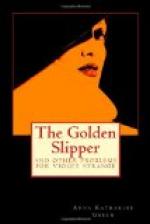“May I have a look at its emptiness?” she asked, with a naive glance at Mr. Van Broecklyn.
“There is positively nothing in the room but the chair Mr. Spielhagen sat on,” objected that gentleman with a noticeable air of reluctance.
“Still, may I not have a look at it?” she persisted, with that disarming smile she kept for great occasions.
Mr. Van Broecklyn bowed. He could not refuse a request so urged, but his step was slow and his manner next to ungracious as he led the way to the door of the adjoining room and threw it open.
Just what she had been told to expect! Bare walls and floors and an empty chair! Yet she did not instantly withdraw, but stood silently contemplating the panelled wainscoting surrounding her, as though she suspected it of containing some secret hiding-place not apparent to the eye.
Mr. Van Broecklyn, noting this, hastened to say:
“The walls are sound, Miss Strange. They contain no hidden cupboards.”
“And that door?” she asked, pointing to a portion of the wainscoting so exactly like the rest that only the most experienced eye could detect the line of deeper colour which marked an opening.
For an instant Mr. Van Broecklyn stood rigid, then the immovable pallor, which was one of his chief characteristics, gave way to a deep flush as he explained:
“There was a door there once; but it has been permanently closed. With cement,” he forced himself to add, his countenance losing its evanescent colour till it shone ghastly again in the strong light.
With difficulty Violet preserved her show of composure. “The door!” she murmured to herself. “I have found it. The great historic door!” But her tone was light as she ventured to say:
“Then it can no longer be opened by your hand or any other?”
“It could not be opened with an axe.”
Violet sighed in the midst of her triumph. Her curiosity had been satisfied, but the problem she had been set to solve looked inexplicable. But she was not one to yield easily to discouragement. Marking the disappointment approaching to disdain in every eye but Mr. Upjohn’s, she drew herself up—(she had not far to draw) and made this final proposal.
“A sheet of paper,” she remarked, “of the size of this one cannot be spirited away, or dissolved into thin air. It exists; it is here; and all we want is some happy thought in order to find it. I acknowledge that that happy thought has not come to me yet, but sometimes I get it in what may seem to you a very odd way. Forgetting myself, I try to assume the individuality of the person who has worked the mystery. If I can think with his thoughts, I possibly may follow him in his actions. In this case I should like to make believe for a few moments that I am Mr. Spielhagen” (with what a delicious smile she said this) “I should like to hold his thesis in my hand and be interrupted in my reading by Mr. Cornell offering his glass of cordial; then I should like to nod and slip off mentally into a deep sleep. Possibly in that sleep the dream may come which will clarify the whole situation. Will you humour me so far?”




